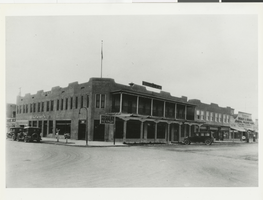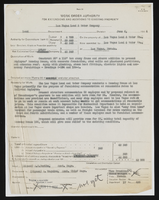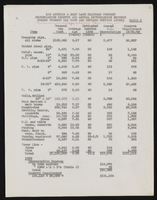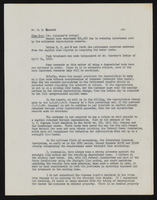Search the Special Collections and Archives Portal
Search Results

Apolonio Sauceda interview, August 13, 2019: transcript
Date
Archival Collection
Description
Interviewed by Barbara Tabach and Monserrath Hernández. Born in 1927 to Mexican immigrant parents, Apolonio spent his youth in the Kansas City, Kansas area. Arrived in Las Vegas and was a map maker for Clark County. Very involved in local Latino community, NALA, Veterans organizations, and was an actor on the side. Subjects: NALA, American Legion, Lt. Colonel in Nevada Color Guard
Text

Rocio Rodríguez-Martinez oral history interview: transcript
Date
Archival Collection
Description
Oral history interview with Rocio Rodríguez-Martinez conducted by Elsa Lopez and Monserrath Hernández on June 21, 2019 for the Latinx Voices of Southern Nevada Oral History Project. Rocio shares her personal history growing up in Bogotá, Colombia and how she immigrated to the United States. She talks about motherhood, her Latina identity, and her experiences raising her daughter in Los Angeles and Las Vegas with her husband. Rocio also discusses her employment history and how she was able to achieve her professional goals of becoming a Spanish and English teacher for the Clark County School District (CCSD)'s Family and Community Engagement Services (FACES) program. Her interview is conducted in Spanish. Subjects discussed include: Bogotá, Colombia; El Salvador; Family and Community Engagement Services (FACES).
Text

Michael Arage oral history interview: transcript
Date
Archival Collection
Description
Oral history interview with Michael Arage conducted by Dalton DuPré on November 12, 2021 for Reflections: The Las Vegas Asian American and Pacific Islander Oral History Project. In this interview, Michael Arage discusses his upbringing in the Greater Toronto Area (GTA), Ontario, Canada with his sister and his Filipino-Palestinian heritage. He talks about how his parents immigrated to the United States, his life and education in Toronto, and his relocation to Los Angeles, California where he married his wife. Michael Arage shares how the couple moved to Las Vegas, Nevada in 2012 when his wife started a job at Zappos. Because he lacked a work visa, Michael Arage began playing poker and working in sports betting. In 2019, he founded a community organization to support the people of Palestine, called Nevadans for Palestinian Human Rights. Michael Arage talks about his activism efforts, anti-Arab racism, his cultural upbringing, and of Filipino and Arabic foods and customs. He also shares his views of living in Las Vegas, the difficulties of raising a child away from her cousins, and differing governmental policies and healthcare between Canada and the United States.
Text

Photograph of the front exterior of the Hotel Nevada (Las Vegas), circa 1910
Date
Archival Collection
Description
Hotel Nevada after the addition of a balcony. Transcribed from photo sleeve: "by Florence Lee Jones ... March, 1969. Early Las Vegas History. The Hotel Nevada, at the Southeast corner of Main and Fremont Streets, is the oldest continuous hotel business in Las Vegas, although it has been known as Sal Sagev (Las Vegas spelled backward) since 1928. The hostelry started as a tent in 1905, but the late John Miller soon erected a permanent building, shown above, which provided the most luxurious accommodations and the best food in Las Vegas for many years. In the 1930's the Sal Sagev Hotel had one of the three elevators in town. A private dining room was a popular place for private parties for the elite of the town. The hotel is now owned and operated by Miller's son, Abe Miller, and his daughter, Mrs. Sherman E. Nugent. The Golden Gate Club now occupies much of the first floor of the building. On the North side of the building is a sign "Bank of Southern Nevada", which was the second bank established in Las Vegas. (The other was the First State Bank.) Started by John F. Miller, Ed Von Tobel, Sr., Will Beckley, Attorney Frank Stevens, and Hal D. Buzick, the Bank of Southern Nevada was an important factor in Southern Nevada's economy. During the 1930's and the Depression, the federal government issued restrictive orders on bank operations. The reaction of the independent Las Vegans was 'No guy in Washington is going to tell us how to run our bank.' ... So they paid off all the depositors and closed the bank. The Rhoads & Rhoads General Machine Works (extreme right) was one of the first automobile agencies in town - the start of Community Chevrolet."
Site Name: Hotel Nevada
Address: 1 Fremont Street
Image
Sadie and Hampton George Papers
Identifier
Abstract
The Sadie and Hampton George Papers (1874-1948) consist primarily of the incoming and outgoing correspondence of Sadie Kiel George and her husband, Hampton George, regarding proposed land and mineral rights sales. The collection also includes some personal correspondence, and two of the most significant letters in the collection deal with the deaths of brothers William and Edward Kiel, Sadie's uncles, who were found dead at the Kiel Ranch in October 1900. Also included in the collection are receipts, cancelled checks, tax notices, mining claims, and land deeds.
Archival Collection
Karl Carsony Papers
Identifier
Abstract
The Karl Carsony Papers (1918-2011) are comprised of photographs, newspaper clippings, ephemera, and artifacts representing Karl (Schrom) Carsony's acrobatic career and personal life. The bulk of the materials in this collection date from approximately the early 1950s through the late 1970s. The materials also include vacation photographs of Karl (Schrom) Carsony and his wife, Margot Meyers. The materials also include promotional photographs, posters, and fliers for the Carsony Brothers, which was an acrobatic show consisting of Karl Carsony and his twin brothers, Joe and Bert Schrom.
Archival Collection
Bob McCaffery Collection on the Save the Hughes Flying Boat Campaign
Identifier
Abstract
The Bob McCaffery Collection on the Save the Hughes Flying Boat Campaign (1980-1983) documents efforts by activists to preserve the plane from destruction and its subsequent acquisition by the Aero Club of Southern California in 1980. The collection contains photographs and newspaper clippings about the Hughes H-4 Hercules flying boat nicknamed the "Spruce Goose" from the 1980s.
Archival Collection



